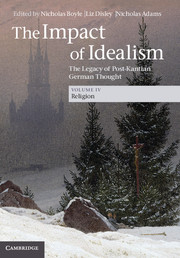Book contents
- Frontmatter
- Contents
- List of Contributors
- Acknowledgements
- List of Abbreviations
- Introduction: the impact of Idealism on religion
- 1 The impact of Idealism on Christology: from Hegel to Tillich
- 2 German Idealism's Trinitarian legacy: the nineteenth century
- 3 German Idealism's Trinitarian legacy: the twentieth century
- 4 Kierkegaard, Hegelianism and the theology of the paradox
- 5 Biblical hermeneutics: from Kant to Gadamer
- 6 Aesthetic Idealism and its relation to theological formation: reception and critique
- 7 The autonomy of theology and the impact of Idealism: from Hegel to radical orthodoxy
- 8 Faith and reason
- 9 Rabbinic Idealism and Kabbalistic realism: Jewish dimensions of Idealism and Idealist dimensions of Judaism
- 10 ‘In the arms of gods’: Schelling, Hegel and the problem of mythology
- 11 Dialectic and analogy: a theological legacy
- Bibliography
- Index
- References
3 - German Idealism's Trinitarian legacy: the twentieth century
Published online by Cambridge University Press: 05 December 2013
- Frontmatter
- Contents
- List of Contributors
- Acknowledgements
- List of Abbreviations
- Introduction: the impact of Idealism on religion
- 1 The impact of Idealism on Christology: from Hegel to Tillich
- 2 German Idealism's Trinitarian legacy: the nineteenth century
- 3 German Idealism's Trinitarian legacy: the twentieth century
- 4 Kierkegaard, Hegelianism and the theology of the paradox
- 5 Biblical hermeneutics: from Kant to Gadamer
- 6 Aesthetic Idealism and its relation to theological formation: reception and critique
- 7 The autonomy of theology and the impact of Idealism: from Hegel to radical orthodoxy
- 8 Faith and reason
- 9 Rabbinic Idealism and Kabbalistic realism: Jewish dimensions of Idealism and Idealist dimensions of Judaism
- 10 ‘In the arms of gods’: Schelling, Hegel and the problem of mythology
- 11 Dialectic and analogy: a theological legacy
- Bibliography
- Index
- References
Summary
Hegel presented Trinity as a dialectically developing movement of divine subjectivity and Schelling proposed an understanding of Trinity as the dynamic interaction of three divine potencies becoming three divine Persons in a renewed fullness of divine being. This presentation and this proposal were so impressive, even in various aspects persuasive, that it would be hard to delimit their influence on twentieth-century Trinitarian thought. The impact these German Idealists have had on subsequent Trinitarian thinking, and especially on that of the twentieth century, should come as little surprise, given the insight, industry and intention toward inclusiveness with which they have creatively handled so many universal themes of ongoing human and religious importance in their Trinitarian considerations. These themes include, for example, subjectivity and objectivity, personhood, spontaneity, freedom and necessity, alienation, spirit, history, universality and particularity, community, infinity, revelation, being as becoming, spirit, and experience and knowledge of God.
Tracing the Idealist Trinitarian legacy
Tracing the twentieth-century Idealist Trinitarian legacy at a farther remove from the first half of the nineteenth century involves a process of interpretation, at times more art than science, than would be the identification of Idealist influence and resultant impact in the nineteenth century. This process requires paying attention to more general considerations as well as factors related to the self or the one interpreting and to the other or that which is the subject of interpretation.
- Type
- Chapter
- Information
- The Impact of IdealismThe Legacy of Post-Kantian German Thought, pp. 69 - 90Publisher: Cambridge University PressPrint publication year: 2013

